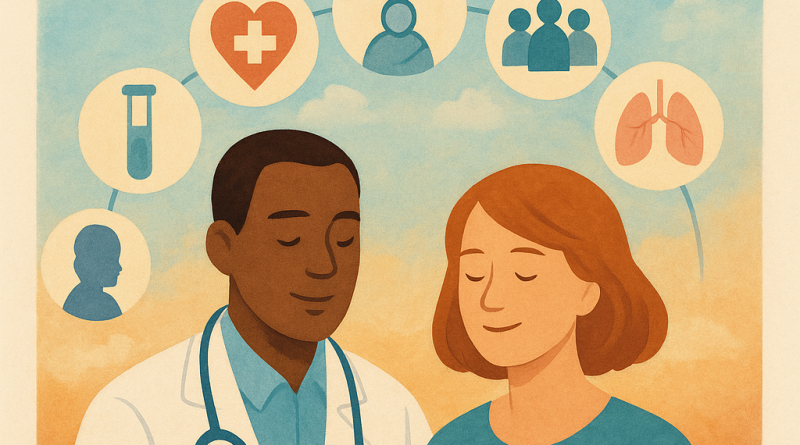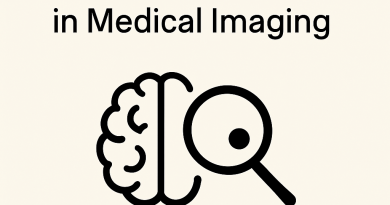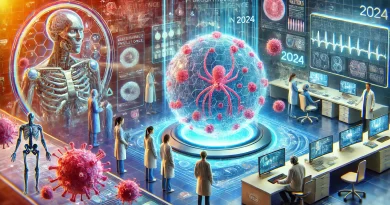How Claude.ai Powers Our Multi-Agent Cancer Care System
Published: November 17, 2025
Author: CureCancer.info Team
The Challenge of Complexity
Two weeks ago, we introduced our AI-powered cancer research platform. Today, we’re pulling back the curtain to show you the technology that makes it possible: Claude.ai by Anthropic.
Cancer care is inherently complex. A single patient case might require input from oncologists, radiologists, ethicists, social workers, and spiritual advisors. Coordinating these perspectives while maintaining consistency, transparency, and ethical standards presents enormous challenges—challenges that traditional AI systems struggle to address.
That’s where Claude.ai comes in.
Why Claude.ai?
We evaluated numerous AI platforms before choosing Claude.ai as the foundation for our multi-agent system. Here’s what set Claude apart:
1. Constitutional AI and Ethical Reasoning
Claude is built with Constitutional AI, a framework that ensures AI systems behave ethically and helpfully. For cancer care, this matters immensely. Our system needs to:
- Respect patient autonomy and dignity
- Navigate complex ethical dilemmas
- Provide balanced perspectives on end-of-life care
- Honor diverse cultural and religious beliefs
Claude’s ethical reasoning capabilities allow our agents to handle these sensitive topics with appropriate nuance and compassion.
2. Long Context and Nuanced Understanding
Medical cases are information-dense. A single patient might have:
- Years of medical history
- Multiple imaging studies
- Lab results and pathology reports
- Treatment history and outcomes
- Psychosocial factors and family dynamics
Claude’s ability to process and understand long, complex contexts means our agents can consider the full picture, not just isolated data points.
3. Multi-Domain Expertise
Our system spans 21 different domains—from molecular biology to moral philosophy, from pathology to pharmacology. Claude’s broad knowledge base allows us to create specialized agents that can engage meaningfully across this entire spectrum.
Building the Multi-Agent Architecture
Here’s how we’ve architected our system using Claude.ai:
The Agent Orchestrator
At the heart of our system is the Agent Orchestrator—a Claude-powered coordinator that:
Patient Query → Orchestrator Analysis → Route to Specialists → Synthesize ConsensusThe orchestrator determines which of our 57 agents should weigh in on a particular question. For treatment planning, it might activate:
- Medical, surgical, and radiation oncologists
- Pathologists for tissue analysis
- Radiologists for imaging review
- Geneticists for genomic profiling
- Ethics team for treatment options analysis
- Social workers for practical considerations
- Mental health professionals for emotional support
- Oncology nurses for care coordination
- Pharmacists for drug interactions
- Religious advisors if requested by the patient
Specialized Agent Personas
Each agent is a distinct Claude instance with specialized instructions and knowledge focus. For example:
Dr. Molecular (Research Oncologist) focuses on:
- Genomic analysis and biomarkers
- Targeted therapy options
- Clinical trial matching
- Precision medicine approaches
Bioethics Chaplain considers:
- Religious perspectives on treatment decisions
- Spiritual dimensions of illness
- Faith-informed end-of-life care
- Integration of belief systems with medical care
Consensus Building
After individual agents provide their perspectives, the orchestrator synthesizes consensus by:
- Identifying points of agreement across specialties
- Highlighting areas of disagreement or uncertainty
- Weighing evidence quality and recommendation strength
- Creating a prioritized action plan
- Documenting minority opinions for consideration
Real-World Example: Treatment Planning
Let’s walk through a real scenario (anonymized):
Case: 62-year-old patient with newly diagnosed stage 3 lung cancer, multiple comorbidities, lives alone, limited insurance coverage.
Traditional Approach:
- Sequential specialist appointments over 2-4 weeks
- Fragmented communication between providers
- Patient overwhelmed with conflicting information
- Delays in treatment initiation
Our Claude-Powered Approach:
- Immediate Multi-Specialist Consultation (minutes, not weeks)
- Oncology team analyzes tumor characteristics
- Radiology team reviews imaging
- Ethics team considers treatment options given comorbidities
- Social work identifies support resources
- Insurance agent verifies coverage options
- Comprehensive Analysis
- All perspectives integrated into coherent picture
- Trade-offs clearly articulated
- Patient values and preferences centered
- Practical barriers identified and addressed
- Actionable Plan
- Prioritized treatment recommendations
- Insurance authorization strategy
- Social support coordination
- Mental health resources
- Follow-up schedule
All documented in our chat.md audit trail for transparency and quality assurance.
The Power of Transparency
Every interaction with our Claude-powered agents is logged to chat.md. This creates:
Accountability: Medical teams can review exactly how recommendations were generated.
Quality Assurance: Supervisors can audit agent performance and identify areas for improvement.
Patient Trust: When appropriate, patients can see the multi-perspective analysis that informed their care plan.
Continuous Improvement: We learn from every case to enhance agent performance.
Challenges We’ve Solved
Challenge 1: Maintaining Consistent Agent Personalities
Solution: Carefully crafted system prompts for each agent specialty, with regular validation of response quality.
Challenge 2: Preventing Agent Hallucinations
Solution: Grounding all agents in evidence-based medicine, with explicit instructions to acknowledge uncertainty and cite sources.
Challenge 3: Balancing Speed with Thoroughness
Solution: Tiered consultation protocols—quick consults for urgent matters, comprehensive reviews for complex cases.
Challenge 4: Integrating Diverse Viewpoints
Solution: Structured consensus protocols that ensure all perspectives are heard while producing actionable recommendations.
What This Means for Cancer Care
By leveraging Claude.ai’s capabilities, we’ve created a system that:
- Scales expertise without scaling costs
- Ensures comprehensive analysis of every case
- Maintains ethical standards through built-in reasoning
- Documents decision-making for transparency
- Supports human professionals rather than replacing them
Looking Ahead
The potential of Claude-powered multi-agent systems extends far beyond our current implementation. We’re exploring:
- Real-time integration with electronic health records
- Patient-facing conversational interfaces
- Automated literature reviews for emerging treatments
- Predictive modeling for treatment outcomes
Next Time: In our December 1st post, we’ll show you how we built this system using Claude Code CLI—the powerful command-line interface that enabled rapid agent development and deployment.
About Claude.ai
Claude is an AI assistant created by Anthropic with a focus on being helpful, harmless, and honest. Learn more at anthropic.com/claude
About CureCancer.info
Building next-generation AI tools for cancer research and patient care. Visit us at CureCancer.info
Disclaimer: This AI system is designed to assist medical professionals and is not a substitute for professional medical care. All treatment decisions should be made in consultation with qualified healthcare providers.
Have questions about our use of Claude.ai? Interested in collaboration? Contact us at CureCancer.info
![]()




